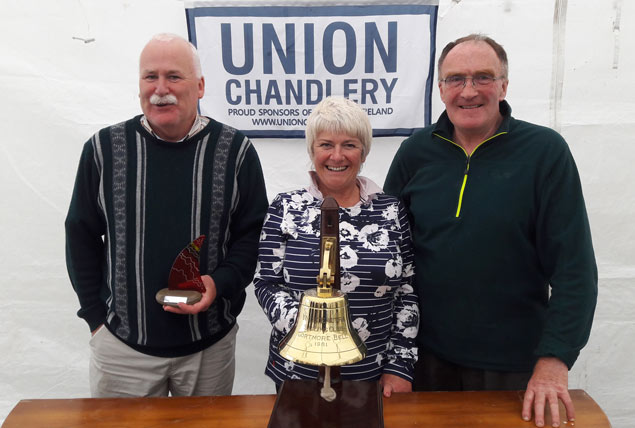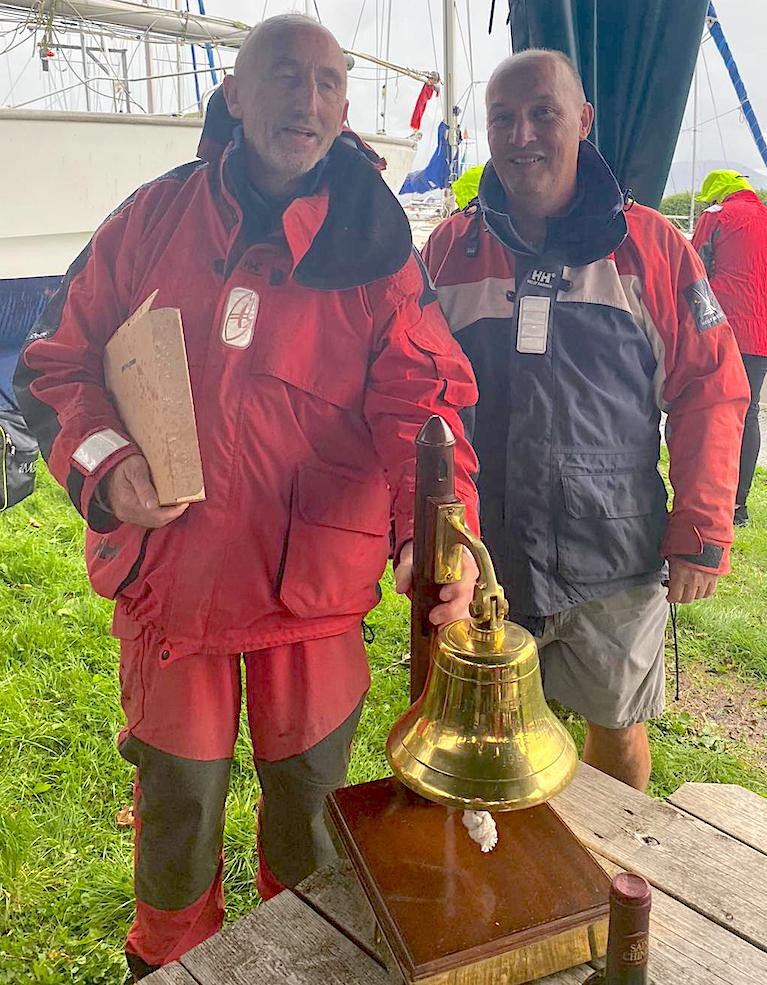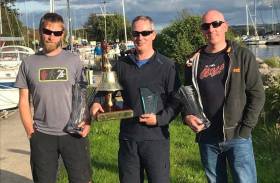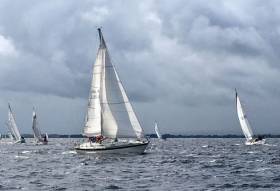Displaying items by tag: Gortmore Bell Race
Pengy Wins Iniscealtra Sailing Club's Gortmore Bell Race on Lough Derg
The Iniscealtra Sailing Club annual Gortmore Bell race took place on Lough Derg on Saturday 11th September. With a forecast of only 5 to 7 knots, the course was shortened considerably to round Coose mark rather than Gortmore and return home to Mountshannon via Garrykennedy.
The Class 2 boats started 30 mins earlier than class 1 but with the wind shutting down at regular intervals it wasn’t long before class 1 caught up with a becalmed fleet at Hare Island. In class 1, it was ‘Sonic Boom’, an SB20, that led the fleet around Coose mark and managed to extend the lead further on the water to finish over 1hr ahead of the fleet on elapsed time.
 The Gortmore Bell and race prizes
The Gortmore Bell and race prizes
The battle for the win on corrected time was firmly within the class 2 fleet with the wind filling into a steady 10 knots for the latter stages. Pengy helmed by Brendan Watson and Ali Baba helmed by Brendan Sheppard managed to keep their boats whispering along at all times through the light and incredibly variable conditions, challenging the class 1 boats all day.
It was Pengy, a Beneteau First skippered by Brendan Watson that won out, in the end, to claim the Gortmore Bell trophy with Maybee sailed by Philip Despard winning Class 1 and Sonic Boom helmed by Andrew Deakin taking line honours.
Sea Saw Wins Iniscealtra Sailing Club's Gortmore Bell Race
The Iniscealtra Sailing Club annual Gortmore Bell Race took place on Lough Derg on Saturday, 5th September. With a forecast of 15 to 20 knots westerly and sunshine, it promised to be a good day sailing for the 28-boat fleet.
The class 2 boats started 30 mins earlier than class 1 with ‘Sea Saw, a Halberg Rassey 352 leading on the water in the nice reaching conditions. In class 1, it was ‘Sonic Boom’, an SB20, that led the fleet out and enjoyed the fast reaching conditions to overtake class 2 and reach the turning mark off Gortmore point in just under 1hr 45min.
 A 28-boat fleet raced for the Gortmore Bell on Lough Derg
A 28-boat fleet raced for the Gortmore Bell on Lough Derg
The fleet enjoyed a long forereach south from Gortmore and it was Passet Partout in class 1, a Dufour Classic who made big gains on this leg. As the wind rose from the west it led to a challenging beat from Mountaineer buoy back to Mountshannon, especially for the smaller boats in the fleet.
It was See Saw helmed by Ken O’Farrell in class 2 that won out, in the end, to claim the Gortmore Bell trophy with Passet Partout, sailed by Joe Gilmartin winning Class 1 and Sonic Boom the first home of the SB20 fleet.
SB20 'Sonic Boom' Wins Iniscealtra Sailing Club's Gortmore Bell Race
The Iniscealtra Sailing Club annual Gortmore Bell race took place on Lough Derg on Saturday 7th September. With very light wind forecast for the day, the usual 30-mile race was shortened to 20 miles, so the race turned at the Coose Bay mark rather than the usual Gortmore.
The class 2 boats started 30 mins earlier than class 1 with ‘Whisper’, a comfort 30, taking the early lead on the water. In class 1, it was ‘Sonic Boom’, an SB20, that led the fleet out. It was these two boats that ended up fighting for the overall win.
‘Sonic Boom’ caught up the 30-minute deficit just before the last turning mark. The northerly wind died out momentarily and was replaced with a Westerly enabling the two class leaders to reach the new breeze first and they stretched out on the rest of the fleet to take first in each class with ‘Sonic boom’, sailed by Andrew Deakin, Brian McElligott and Colm McElligott taking the overall win having gained a further 23 minutes on the shifting upwind leg to the finish.
The wind speed dropped again after the leaders finished, making it a long last leg for the remaining fleet. Second in Class 1 went to ‘Silk’, a First Class 10, with third going to ‘Zombie’, a Platu 25. In Class 2, second place went to ‘Celtic Charisma’, a Kelt 29 and third place went to ‘Serendipity’ a westerly Longbow.
LaBamba Claims Gortmore Bell Race on Lough Derg
The Gortmore Bell Race, sponsored by Union Chandlery took place this Saturday on Lough Derg with 23 boats taking part across two classes.
This is the lough's longest race in the calendar from Iniscealtra Sailing Club’s base in Mountshannon to the Gortmore mark near Portumna and home via Mountaineer rock buoy near Domineer.
Class 2 got underway first at 10:45 followed 30 min later by class 1 at 11:15 in a NW breeze which was set to increase as the morning went on. 1st around the Gortmore mark and heading for home was Serendipity helmed by Robert Bourke, first around in Class 1 was Jumping Jack Flash helmed by Dominic O’Sullivan. The breeze increased to 30–kts at times which made for exiting reaching conditions for the three SB20’s in the fleet who managed to hold they asymmetric spinny’s from Coose mark to Mountaneer bouy. Line honours was claimed by the SB20 Jumping Jack Flash followed quickly by the rest of the fleet with all boats finished by 16:40pm.
 Gortmore Bell Winners 2017 – (from left to right) Sean Collins, Mary and Mike Sadlier of La Bamba
Gortmore Bell Winners 2017 – (from left to right) Sean Collins, Mary and Mike Sadlier of La Bamba
1st Place Overall and in Class 1 was LaBamba helmed by Mary Sadlier and crewed by Mike Sadlier and Sean Collins, 1st Place in Class 2 was Serendipity helmed by Robert Bourke, 1st Place in J24 fleet was Jobs for the Buoys, helmed by Barney Power and 1st place in SB20 fleet was claimed by Jonathan Foley’s Jumping Jack Flash helmed by Dominic O’Sullivan.
Full results attached below for download.
































































